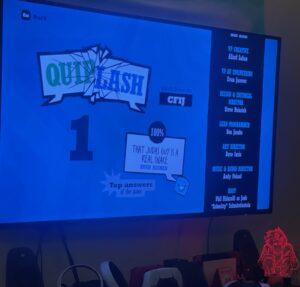Jackbox Party Pack is a collection of party games developed by Jackbox Games that is available on most current generation and last generation systems. While many ages could potentially enjoy the content, the mature subject matter seems more suited to young adults and older. Of the many games available, Quiplash is a fan-favorite judging game where players answer prompts and then vote on the best responses from their fellow players. Naturally, judging is a key mechanic in the game that, in tandem with the open-endedness of the prompts over multiple rounds, allows players to either learn about or use existing knowledge of the other players’ preferences to craft curated responses that develop comedic momentum and intimacy between players.
In my playtest, I found that there were two primary strategies for judging: voting by thoughtfulness or voting by heart, that is what gives belly laughs. Roughly, the player’s response that receives the most votes is primed to win, so when other players are deciding what response to vote for, they may be inclined to vote for the option that they think doesn’t correspond to the winning player. Perhaps this way is drab for some, but people do like to win. However, the anonymity of the responses is key since players can’t actually know who they’re voting for. Multiple rounds of judging. however, allows for other players to pick up on this behavior and adjust their strategy around it, disguising their personalized answers.
In my experience, most of my friends were belly laugh players (my favorite way to play unless I’m super close to winning). This isn’t bad for strategy, however. As in any judging game, playing to the audience’s tastes is key to winning. Since each player responds to two prompts per round, players have room to experiment and get the vibe of their fellow players. One magical phenomena that manifests from this is what I’d call “momentum.” In early rounds, whether through absurdity or some sort of reference to a fun event that day, something of an inside joke or humorous precedent can be established. Then that inside joke will be at play the whole game, mutating and morphing to fit the prompts the games provide. Momentum evolves the comedic atmosphere as joke ideas in early rounds become the basis for some funny jokes in other rounds.

Momentum instills intimacy in the group since players will feel out jokes that please the group, and this intimacy allows momentum to perpetuate itself since players will receive more to go off for future prompts. While playing, I remember reflecting on what my audience found funny, and in particular, I thought about the voting habits of the individual players. My mind went to “What would Alexander find funny?” or “What’s a reference that everyone here will get but that’s not too basic?” This not only allowed me to feel more connected to my fellow players but also appreciated since other players tried to cater to my tastes as well, which promoted a distinct sense of fellowship in the game.





